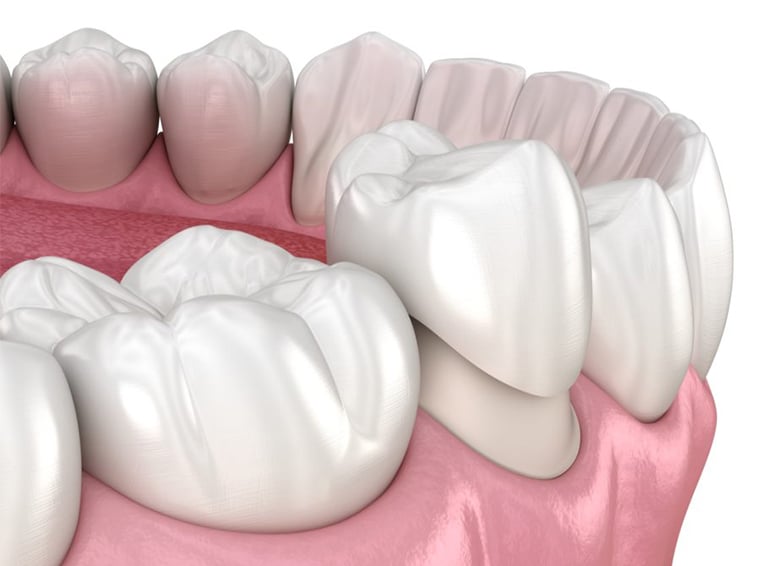

Dental Crowns
A dental crown is a general dentistry procedure sometimes called a cap because it covers or ‘caps’ the entire tooth, so none of your original tooth is visible.



A dental crown is a general dentistry procedure sometimes called a cap because it covers or ‘caps’ the entire tooth, so none of your original tooth is visible.

Book Nowor Call718.461.0100
 We fabricate our dental crowns from a range of durable materials, including gold, porcelain fused to metal, porcelain only, and zirconia. Once we fit a dental crown, it provides excellent protection for the tooth underneath. A well-crafted, custom crown can improve the appearance of your smile.
We fabricate our dental crowns from a range of durable materials, including gold, porcelain fused to metal, porcelain only, and zirconia. Once we fit a dental crown, it provides excellent protection for the tooth underneath. A well-crafted, custom crown can improve the appearance of your smile.
Porcelain dental crowns are often the most effective way to preserve as much of the structural integrity of a damaged tooth as possible while restoring its health, shape, and overall appearance. Custom-crafted to cover the entire surface area of the tooth, dental crowns are an excellent treatment for teeth that are cracked, broken, or structurally weak. By restoring strength to these weaker teeth, our dentists can significantly reduce and often eliminate tooth pain or sensitivity. In the process, porcelain crowns also conceal flaws in the appearance of the teeth, resulting in a more radiant, balanced, and aesthetically pleasing smile.
“Preserve the structural integrity of a damaged tooth while restoring its health, shape, and appearance.”
Although there are a variety of options for replacing missing teeth or teeth too damaged to salvage, it is always best to save some of the natural tooth, if at all possible. Aside from the removal of decay or other areas of damage, dental crowns require further reshaping of the natural tooth to accommodate their size. They also protect the basic foundation of the natural tooth, which eventually can be lost if left untreated. As a result, dental crowns help patients avoid more serious future dental problems associated with missing teeth, such as the degradation of the jawbone and other oral tissues, and the shifting of surrounding teeth from their optimal positions.
At Gentle Dental, we use finely crafted porcelain dental crowns in a number of treatments. Sometimes we use them to secure larger fillings in teeth that are fragile or otherwise structurally compromised. They are also used to support the replacement teeth in dental bridges, as well as to replace missing individual teeth when attached to dental implant posts. Dr. Knop and Dr. Gelfand rely on their years of dental expertise to create dental crowns that blend beautifully with surrounding natural teeth, ensuring results that are as cosmetically impressive as they are strong and functional.
Usually, a dental crown is necessary if you have a severely damaged tooth and where much of its original structure is missing. Damage can occur because of decay or trauma. A crown is frequently necessary after root canal therapy. Restoring the tooth with a filling wouldn’t provide enough strength, so the tooth would be at risk of cracking or fracturing during everyday use.
A dental crown helps to preserve the remaining structure of the natural tooth. It is always desirable to preserve and protect your natural teeth and prevent potential tooth loss later. Dental crowns are also used to support dental bridges and can also restore individual dental implants.Other times, dental crowns can be fitted purely for cosmetic purposes. For example, a tooth that is too small or peg-shaped, or which isn’t attractive, can be hidden with a dental crown. Teeth crowns are useful for realigning teeth or correcting a person’s bite.
Our dental crowns are custom made, so they fit precisely over the tooth. They are all designed to replicate the size and appearance of real teeth closely. The materials used to fabricate dental crowns are durable and long-lasting. Although crowns can be made from highly polished gold, these are less common nowadays as there is an excellent choice of more natural-looking materials available. Usually, a gold crown would only be used to restore a back tooth that is far less visible.
A dental crown usually requires two visits to prepare the crown and later to fit it over the tooth.
These crowns have a thin, strong substructure or shell made from precious metal alloy. The substructure is covered with porcelain that masks its color. Porcelain fused to metal crowns (PFMs) have been widely used for many decades.PFMs are reliable and provide good results. However, there are more cosmetically appealing materials more suitable for restoring front teeth. A PFM crown can appear slightly opaque because of the way it is constructed. Unlike ceramic crowns, light is prevented from passing through a PFM by the metal substructure.
Another problem is a black line around the margin that can appear after a few years and is due to gum recession. As the gums recede, it exposes the metal edge of the crown. Sometimes a general dentist will overcome this problem by making the crown with a porcelain margin or edge.
All-ceramic or all-porcelain crowns contain no metal and provide exceptional aesthetics. A porcelain crown is ideal when restoring front teeth, creating a natural and beautiful smile. The ceramic material closely replicates tooth enamel, providing a similar degree of translucency. Because the crown is entirely porcelain, light is transmitted right through the restoration, closely resembling the way a real tooth responds to light.A ceramic crown is best used in the front of the mouth or the anterior region. The material used is reasonably strong and long-lasting. One of the best-known makes of ceramic crowns is e.max, but other manufacturers also provide good quality all-ceramic crowns.
Zirconia dental crowns are also metal-free but are considerably stronger than ceramic crowns. They are an excellent choice for restoring back teeth where space is limited. Zirconia is also good for people with bruxism. The material is very resistant to wear and will not harm the opposing teeth.Some zirconia crowns are made entirely from this material, while others have a zirconia substructure covered with porcelain. The resulting restoration looks natural and life-like. The original zirconia crowns did occasionally cause problems because the material used to be bone white and was difficult to mask entirely with porcelain. Nowadays, zirconia crowns do not have these disadvantages, and the material is often pre-shaded to match your tooth.
Porcelain crowns should last for years before they need replacing. You could reasonably expect a crown to last for ten or more years, or even longer when made from zirconia. However, the longevity of a crown does depend on good aftercare. Regularly brushing and flossing around your crowns and visiting your general dentist for checkups and hygiene appointments will help to prolong the life of your crowns. It is important to understand that no restoration will last forever.
The dental crown cost depends on the materials chosen. A PFM is the most cost-effective option, but it may be less aesthetically pleasing. Zirconia crowns are the strongest and are suitable for anywhere in the mouth. All-ceramic crowns can provide the best aesthetics and can be a good choice where appearance is crucial.
Our cosmetic dentist here at Gentle Dental in Bayside, Queens, NY, can discuss all options suitable for your situation and will explain the possible pros and cons of each choice and the difference in costs. As with any treatment we provide, we make sure you have all the information necessary for an informed treatment choice. Whichever option you choose, you are assured of receiving a dental crown that is beautiful, yet fully functional and durable.
Book Nowor Call718.461.0100